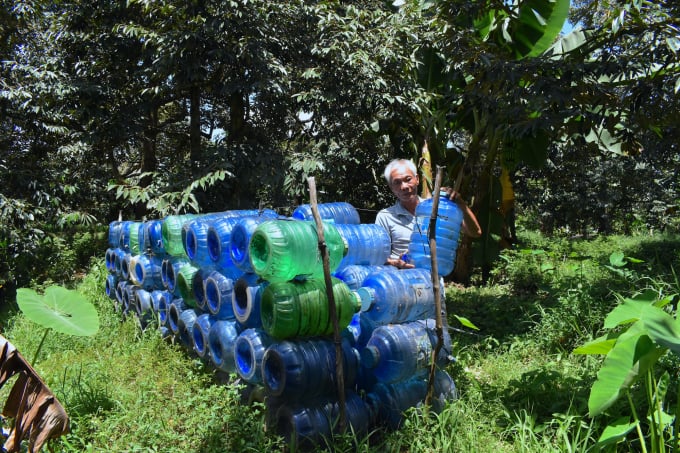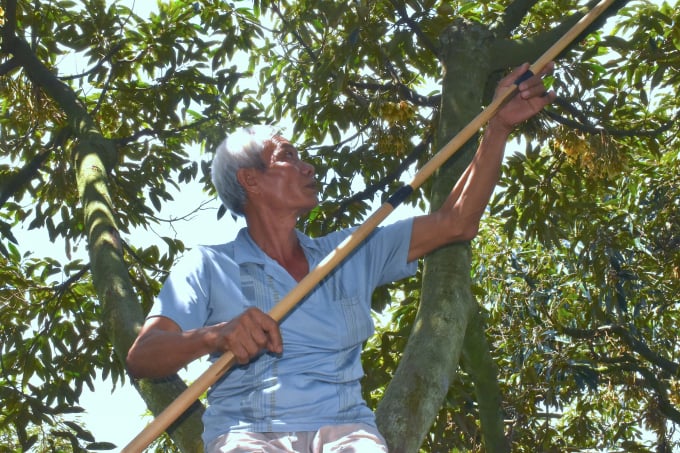May 16, 2025 | 18:55 GMT +7
May 16, 2025 | 18:55 GMT +7
Hotline: 0913.378.918
May 16, 2025 | 18:55 GMT +7
Hotline: 0913.378.918

Mr. Muoi Nghia presenting his anti drought - salt filtered water tank. Photo: Minh Dam.
In the 2019-2020 dry season, Tien Giang province has over 3,000 ha of durian trees affected by saltwater, resulting in severe damage. While many orchards in Tan Phong islet commune were being "encircled by salt", almost to the point of a complete wipeout, elder farmer Tran Van Nghia (Muoi Nghia) in Tan Luong B hamlet, Tan Phong islet commune, Cai Lay district, Tien Giang province, had had a very unique drought resistance model.
Mr. Muoi Nghia had 1 ha of over 20-year-old durian bearing fruit. Amid such a dangerous situation, he came to scientists at Can Tho University to seek help. The professors then told him to use drip watering bottles to save the trees.
He intended to place four bottles of 20 l above the root of each of his 150 trees, so a total of 600 bottles were needed. After obtaining the required number of bottles, he went to the medical suppliers to buy infusion lines to install in the bottles and let them drip water night and day to save the trees.
That year, Mr. Nghia only rented a boat a few times to reserve enough to irrigate 1 ha of durian during the drought season. It only cost him over VND 40 million to buy the bottles and hire a boat to carry freshwater, but the effect was vivid. The tree had overcome the drought and salinity well, showing no signs of damage while bearing fruits. Many households spent hundreds of millions of dong to hire boats to carry water, some others bought a saltwater purifier for VND 800 million, but their orchards all died dry.
"Even though the method is simple, the key to success is that the position of the water bottles must be fixed. Because when watering using the drip irrigation method, the definite amount of water is only sufficient to penetrate a small area. The roots will gather here to absorb water. If the bottles are moved, the efficiency will reduce to naught. I also use a low dose of biological organic nutrients such as fish protein to supplement the trees during the process."

Mr. Muoi Nghia pruning durian flower buds. Photo: Minh Dam.
In the past two years, although the saltwater situation has improved, Mr. Muoi Nghia still takes keen attention to the orchard to prevent sudden attacks of saltwater. He makes full use of his time to dredge ditches with the intention of replenishing nutrients for the trees and creating space for water storage. He also built a freshwater reservoir to store more than 50 m3 of water to spray when saltwater arrives. He regularly monitors the salinity of the river to promptly stock up on irrigation water to avoid being put into a passive stance like the previous years.

Mr. Tran Van Sang built a freshwater reservoir to prevent the influence of saltwater. Photo: Minh Dam.
Mr. Tran Van Sang, like most people in Tan Phong, had tried many ways to bring water to the orchard and save the durian trees in those three months of the 2019 - 2020 dry season but failed. His 9,000 m2 of 180 15-year-old durian trees were half damaged amid the high productivity period (2 tons/1,000 m2).
Feeling sorrowful but seeing no other way out, he had to cut them down and sell them as firewood because some trees were completely dead, while some others were so exhausted that restoration was impossible. The yield of the remaining trees fell severely in the next year, and the money from selling the fruits was just enough to cover the investment.
Although the 2020 - 2021 dry season was forecasted to have a meager drought - salt situation, Mr. Sang still did not slack off in terms of "precautions". He spent VND 120 million renting an excavator to dig a pond capable of containing more than 2,400 m3 of freshwater.
Up to the present date, during the peak of the dry season 2021 - 2022, he continues to pump water to reserve the pond. Watering the trees ten times per month, with 100 l of water for one root, Mr. Sang is confident to prepare enough water to irrigate durian if this salt season lasted three months like the previous one.
"It is a strong defensive fortress in the context of increasingly severe drought and saltwater intrusion. Although the land to build the lake occupies a large area, I actually don't really mind. I can't trade the long-term sustainability for the sake of short-term regret,” said Mr. Sang.
Translated by Samuel Pham

(VAN) Cold-barn systems efficiently manage environmental and temperature conditions, which aids in the prevention of respiratory diseases in pigs and protects them from the vectors that transmit African swine fevers.

(VAN) To tackle challenges, the project 'Addressing key technical bottlenecks in the grouper supply chain in Vietnam' has been underway since 2024.

(VAN) The project 'Disease-Resilient and Sustainable Cassava Production Systems in the Mekong Region', funded by the Australian Center for International Agricultural Research (ACIAR), is being implemented from 2024 to 2028.

(VAN) Data from 10,000 farming households will help professionalize production organization and support the implementation of the One Million Hectares Program for High-Quality, Low-Emission Rice Cultivation.

(VAN) FAO Director-General QU Dongyu marks International Day of Plant Health at NENA conference.

(VAN) Deputy Minister of Agriculture and Environment Hoang Trung affirmed that floriculture and ornamental plants are a growing industry that receives significant global attention.

(VAN) The three staple crops dominating modern diets – corn, rice and wheat – are familiar to Americans. However, fourth place is held by a dark horse: cassava.